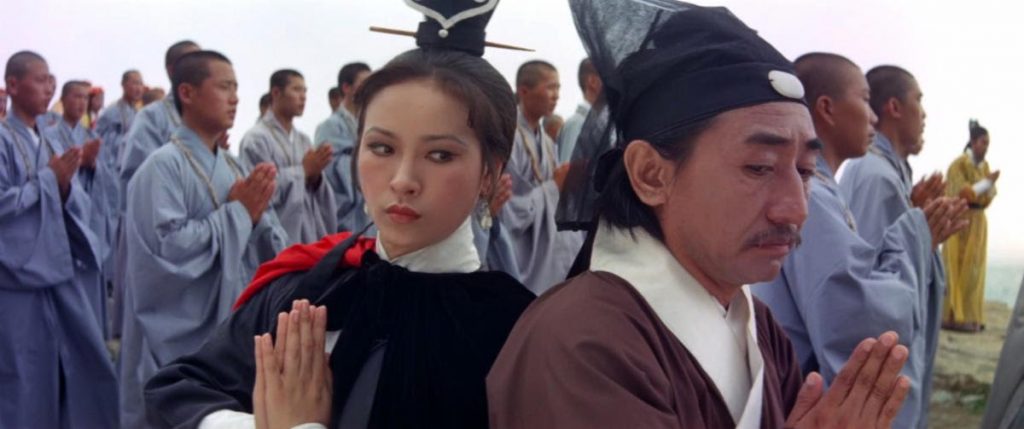The current era of wuxia filmmakers owe a lot to the creative prowess of the legendary Chinese filmmaker King Hu, who elevated Hong Kong and Taiwanese cinema to impressive heights through landmark films such as Dragon Inn and A Touch Of Zen. One thing you could always count on with King Hu was a story that delicately balanced spiritual values with highly skilled martial arts. While lacking somewhat on the latter front compared to some of his films, the 1979 drama Raining In The Mountain impeccably explores themes close to the filmmaker’s heart. Based on an original screenplay from the filmmaker, the narrative trades his favored locale of “the inn” for an ascent to a Buddhist monastery where the troubles of the world should not be able to reach, but ultimately becomes a microcosm of the the common power struggle that plagues all corners of the world. The film is as engrossing as any great mystery film and sports a visual aesthetic that is unrivaled throughout most of cinema.
The story of Raining In The Mountain takes its time in revealing itself as you settle into this Ming Dynasty time period. We first come upon Esquire Wen (Sun Yueh) and his two assistants as they trek up the titular mountain to the Three Treasures Temple. The abbot of the monastery is in the process of choosing his successor, and he seeks guidance from three individuals representing different facets of society. The seemingly sensible Esquire Wen represents the business-minded sector of the country, and the extent of his greed underneath his gentle demeanor is soon revealed by the realization that his assistants are not who they appear to be. His “concubine” is actually the White Fox (Hsu Feng), a notorious thief who, along with Gold Lock (Ming-Tsai Wu, working double-duty as the martial arts choreographer), has been brought to the temple to steal a priceless handwritten scroll of the sutra. This is also the plan of the second guest, General Wang (Tien Fung), a more militaristic figure aided by his own thief, Lieutenant Chang Cheng (Chen Hui-Lou).

The filmmaker plays with interesting themes of the perception of value and the obsession that can manifest from the pursuit of earthly treasures. This scroll causes so much strife within this little community, even going as far as to have ambitious monks siding with these outsiders in hopes of getting a leg up on being chosen as a successor. The scroll has no intrinsic monetary value, though, as each individual has their own ideas of what the scroll represents: a feat of antiquity, a spiritual roadmap or just an old ratty piece of parchment. That this occurs in a place supposedly free of human desires and passions is significant. These two figures have an outside appearance of respectability, yet it is the third visitor Wu Wai (Wu Chia-Hsiang) who seems the most suspect that is the most morally righteous and helpful to the abbot. Wu Wai is a Buddhist master accompanied by a large female entourage, but even with the appearance of possible impropriety the master remains the most virtuous of the three expected visitors.
The one final puzzle piece comes in the unexpected arrival of reformed convict Chiu Ming (Tung Lin), a man who represents the moral purity that Buddhism seeks to achieve. King Hu opts not to stack this story with large physical confrontations, instead choosing to adopt a deliberate pacing of mystery and heist-like elements that will keep you on edge. This makes what confrontations he does include all the more exciting, such as a whisper-quiet smackdown between two parties as they attempt not to be discovered by guards in the adjacent room. A late-film pursuit through the forest provides the most kinetic thrills that wuxia fans will devour with glee. Every element of this film is as beautiful as you would expect from a legend such as King Hu. The cinematography on display will take your breath away at various points. Raining In The Mountain is an incredible piece of filmmaking from both a technical as well as narrative perspective. The farther you go on your journey with it, the more you are rewarded with something quite magical.

Video Quality
This new Blu-Ray from Film Movement Classics gives Raining In The Mountain an AVC encoded 1080p transfer that was sourced from a 2K digital restoration undertaken by the Taiwan Film and Audiovisual Institute. According to title cards before the beginning of the film, the source was culled from a combination of the negative, interpositive and a release print, so the quality can be a bit inconsistent at times. The film has a pretty nice grain structure that preserves the filmic look of the picture, showcasing solid details in the monastery and the forest. There are a few shots that look a bit unnaturally squeezed for some reason, but these are very brief overall. The color timing can be a bit inconsistent with certain moments dramatically leaning towards desaturation which seems to be a product of the source material available to them. Yet, for the most part colors show up on the screen nicely with many vibrant hues popping off the screen. Black levels hold up fairly well with some admirable depth to the image. Some shots contain noticeable softness, but are contained to only a small portion of the film. The damage to the print is noticeable in the color, but overall blemishes are minimal with only the occasional nicks and scratches popping up. Film Movement Classics has delivered a disc that looks as good as the elements would allow.
Audio Quality
This Blu-Ray comes with an LPCM 2.0 mono track in the original Mandarin (with optional English subtitles). Dialogue mostly remains clear without sound effects or the score trouncing on important information. The film employs some playful sound effects that are given the more-than-appropriate weight within the mix. The period-appropriate score from Ta Chiang Wu comes through decently but there are some instances of distortion and audio fluctuations. This is not a particularly dynamic presentation, but it presents everything fairly accurately with only a minimal amount of damage holding it back.

Special Features
The Blu-Ray of Raining In The Mountain includes a booklet featuring the essay “Farewell Dragon Inn” by Samuel Jamier, Executive Director of the New York Asian Film Festival. In this piece, he explores the meaning behind the narrative and provides a deeper historical background. This provides a great amount of context and insight into the film’s legacy that is so worthwhile. The on-disc special features are as follows:
- Audio Commentary: Tony Rayns delivers an invaluable commentary track in which he breaks down a lot of the history of the production, points out some elements that might be unfamiliar to Western audiences, delves into the history of the creative figures and so much more that makes this a necessary listen for fans.
- Treasure of the Spirit: An 18-minute video essay from Chinese language film expert and author Stephen Teo in which he explores the intersection of religious traditions in this film, the deeper meaning behind certain shot compositions and character movement and much more that gives you a greater appreciation for the artistry behind the movie.
- Trailers: A two-minute trailer for Raining In The Mountain is provided here. Trailers are also provided for The Fate Of Lee Khan, Shanghai Triad and Heroes Shed No Tears.
Final Thoughts
Raining In The Mountain is not usually the first film that comes to mind when discussing King Hu, but it is just as strong as some of his best known work. There is less martial arts in this particular tale, but that which does unveil itself is quite a bit of fun. Nearly every element from the story to the performances and other technical aspects are without major fault. Film Movement Classics has given this one a Blu-Ray that has as strong of an A/V presentation as the source material will allow plus a solid array of special features. Recommended
Raining In The Mountain is currently available to purchase on Blu-Ray, DVD and Digital.
Note: Images presented in this review are not reflective of the image quality of the Blu-Ray.
Disclaimer: Film Movement Classics has supplied a copy of this disc free of charge for review purposes. All opinions in this review are the honest reactions of the author.

Dillon is most comfortable sitting around in a theatre all day watching both big budget and independent movies.







